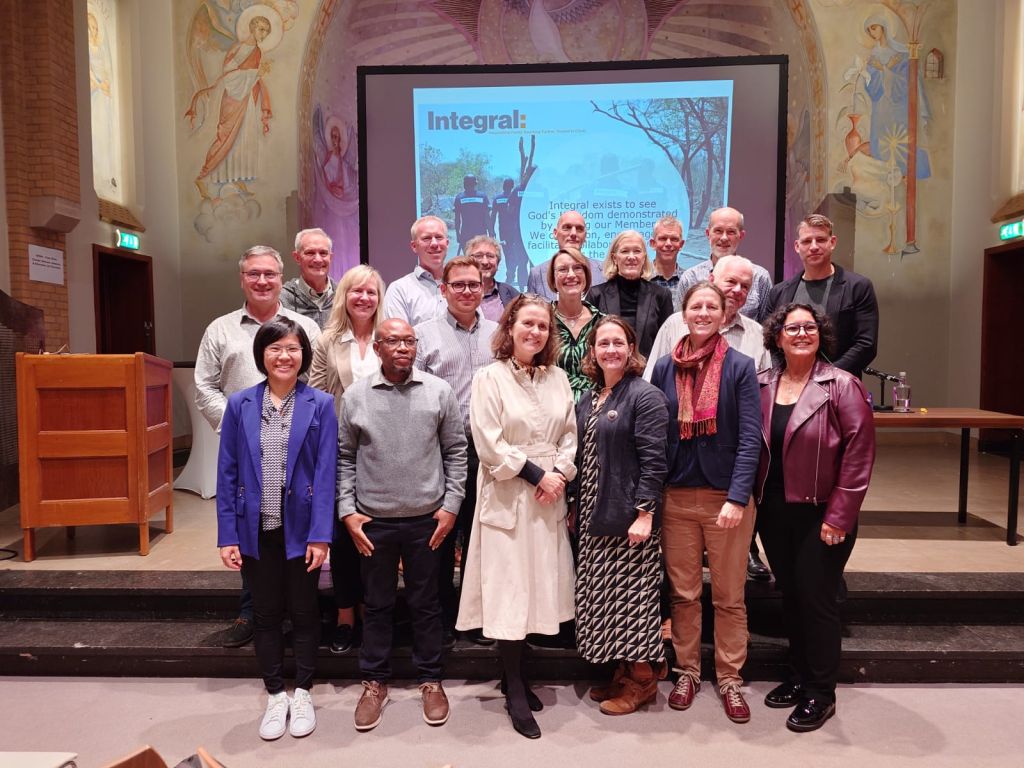Written by Winnie Fung (Chief Executive)
‘See, I am doing a new thing! Now it springs up; do you not perceive it? I am making a way in the wilderness and streams in the wasteland.’ (Isaiah 43:19)
The theme of the 20th Integral Alliance (IA) meeting this year is the ability to see God ‘doing a new thing’. It’s a challenging call, as it is easy to see darkness and despair in our world these days rather than hope and ‘new things’. But as Christians, we follow in His footsteps to care about the poverty and suffering in this world, and it is imperative that we practice the spiritual discipline of seeing God ‘doing a new thing’ and seeing how God is ‘making a way in the wilderness’. Otherwise, our daily brush-up against the world’s brokenness, whether in conflicts, natural disasters, or abject poverty, will only cast one into cynicism and pessimism.

For example, CEDAR partners with Tearfund Ireland, one of the IA members, to serve poor agricultural communities in Wolaita and the SNNP region (Southern Nations, Nationalities, and Peoples’ Region) in Ethiopia. These communities depend on small-scale, subsistence, rain-fed agriculture for their livelihoods, but because of climate change, recurrent drought and harvest failure, they have been struggling to survive. Together with Tearfund Ireland, CEDAR works with a local, church-based NGO called Terepeza Development Agency (TDA), the community development arm of Ethiopia’s Wolaita Kale Heywot Church denomination.
CEDAR organised SALT training (a kind of church and community mobilisation model) for TDA’s development workers, who combined it with Tearfund’s community development model to develop localised training materials for self-help groups. This way of combination is precious and exhibits the kind of organisational humility CEDAR hopes to practice. It brings together both organisations’ strengths while giving the trust and space for local workers to adapt it to local needs. TDA then engages in training for trainers for urban and rural churches so that church members may be equipped and mobilised to form their self-help groups and support their neighbours in practising conservation agriculture and sustainable organic agriculture.
At the same time, CEDAR’s funding towards the Ethiopian development project fulfils Irish Aid’s (the Government of Ireland’s international development aid programme) requirement on matching grants, which allows Tearfund Ireland to secure a large government grant for the development project, so that more people may be served. Therefore, in a very practical way, we experience how God puts one and one together and comes up with more than two ─ in both the design and outworking of the self-help groups and the financial resources raised, and all for the suffering families in Ethiopia and for His Kingdom purpose.
The unity of the global Church is even more important as God ‘makes a way in the wilderness’ in the current war in the Middle East. The Israel-Gaza war has raged on for over a year, with over 44,000 people killed and 1.9 million people displaced.[2] 495,000 people are facing catastrophic levels of food insecurity. Adding to that devastation, last month, we saw the escalation of the Israel-Hezbollah conflict, which has led to more than 2,255 deaths and 1.2 million displacements in Lebanon. [3]
CEDAR has long-term partners in Lebanon, and our heart weeps with our partners and the people of Lebanon as they face the trauma of the loss of family, homes, and livelihoods and as they seek to survive the bombings on a day-to-day basis. We organised a prayer meeting for Lebanon this month and shared updates and prayer requests from our partners. We pray that as a Church, we may stand in solidarity with the people in Lebanon, be they Christians, Jews, or Muslims, be they Lebanese, Israeli, Syrians, or Palestinians, as all are made in the image of God and reflect the face of Jesus.
The sobering truth is that the Israeli-Palestinian conflict, which has been ongoing since 1948, remains an issue of great contention among Christians. The rhetoric of pro-Israel or pro-Palestine can lead to polarisation or even enmity within the Church. This issue was brought up during the Fourth Lausanne Congress in Seoul last month. Rula Khoury Mansour, a Palestinian-Israeli Christian lawyer and theologian, was one of the panellists in the session ‘Reconciliation in Times of Conflict: Stories of Hope’.[4] She calls for reconciliation as ‘not just a nice idea’ but ‘an absolute necessity’.[5] She understands reconciliation as a ‘divine mandate, echoing God’s response to human failure through the establishment of His Kingdom on earth through Christ’.
Mansour calls for Christ’s followers to ‘actively participate in the restoration of humanity, addressing suffering and confronting injustice’. Only ‘through the transformative power of truth, forgiveness, justice, and healing’ can we ‘glimpse the dawn of the new world where hope prevails over despair, and the promise of reconciliation illuminates even the darkest of conflicts’.
CEDAR’s partners in Lebanon and Rwanda are actively engaged in such peacebuilding and reconciliation work. This year marks the 30th anniversary of the Rwanda genocide in 1994. We will be holding a prayer meeting in December to pray for our partners and the people of Rwanda. We invite you to continue to walk with us, and together, may we respond to God’s call to be His agent of light and hope and His hands and feet in practical service.
[1] Integral Alliance. https://integralalliance.org
[2] United Nations Office for the Coordination of Humanitarian Affairs (accessed 16 Oct 2024). https://www.ochaopt.org/content/reported-impact-snapshot-gaza-strip-16-october-2024
[3] Al Jazeera (accessed 16 Oct 2024). https://www.aljazeera.com/news/2024/10/15/un-warns-of-humanitarian-catastrophe-in-lebanon-amid-israel-hezbollah-war
[4] Fourth Lausanne Congress (accessed 21 Oct 2024). https://lausanne.org/video/reconciliation-in-times-of-conflict-stories-of-hope
[5] Rula Khoury Mansour (accessed 21 Oct 2024). https://lausanne.org/global-analysis/peace-and-reconciliation-as-mission-in-a-world-in-conflict-a-christian-perspective-on-the-israeli-palestinian-conflict

